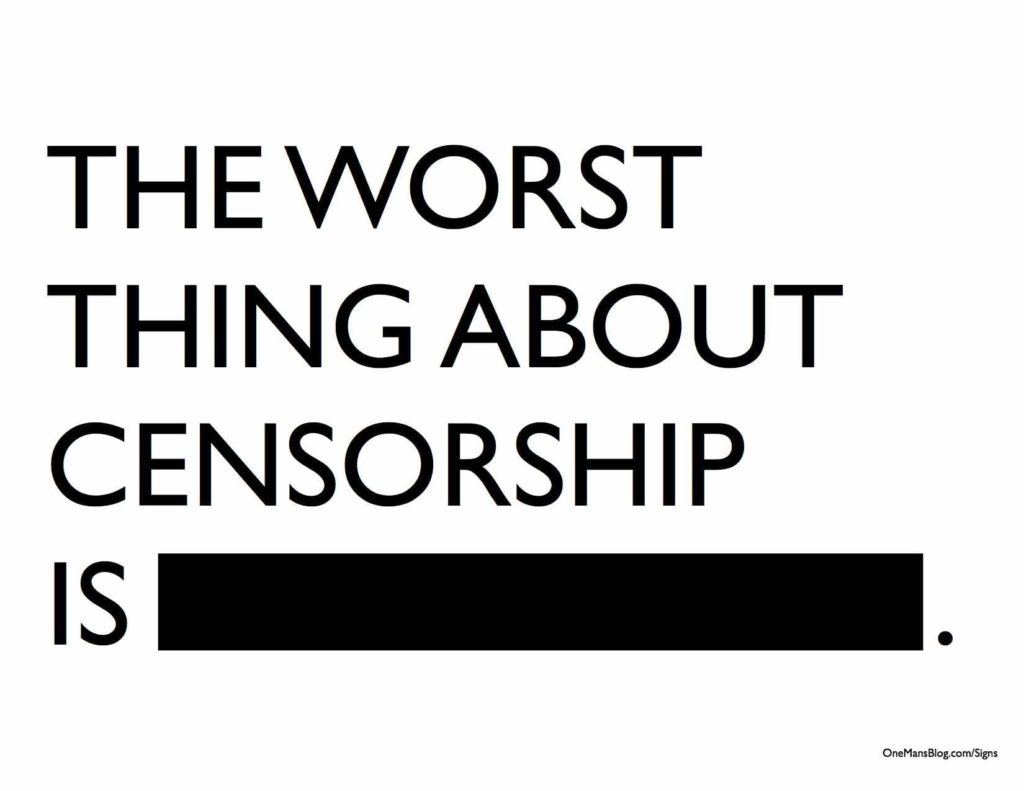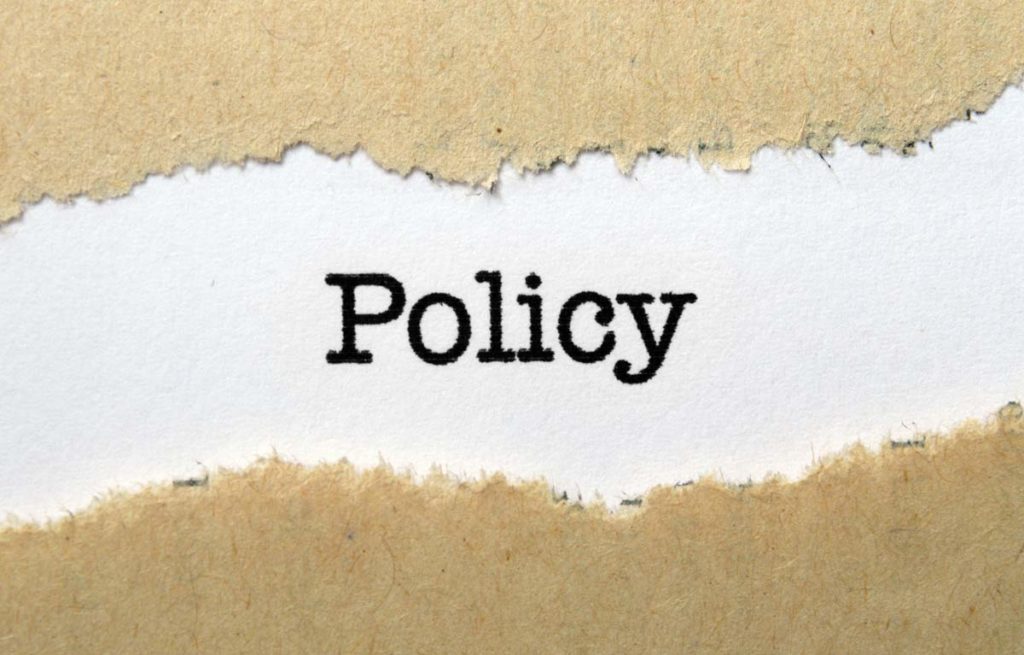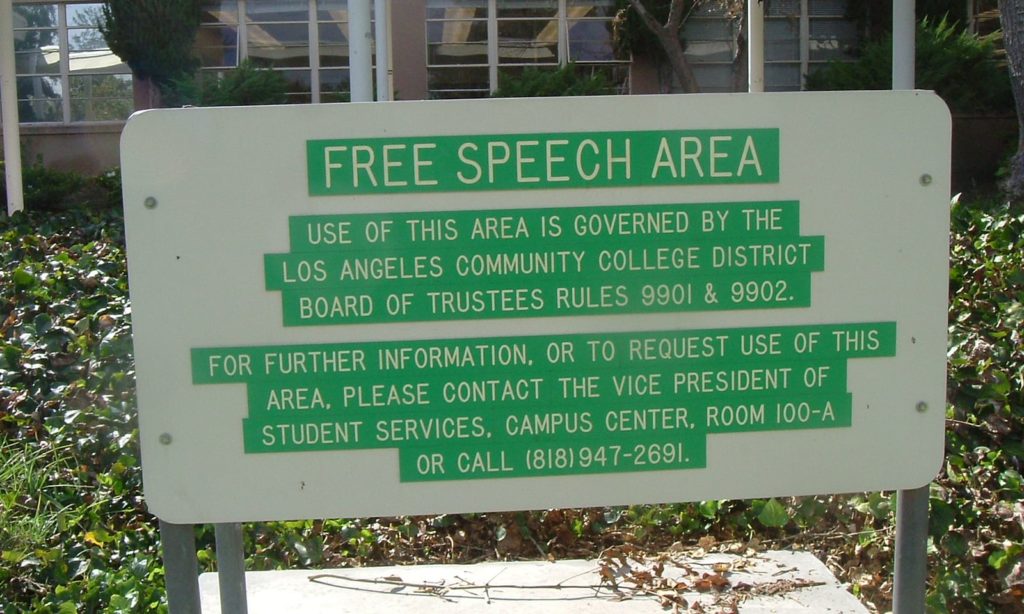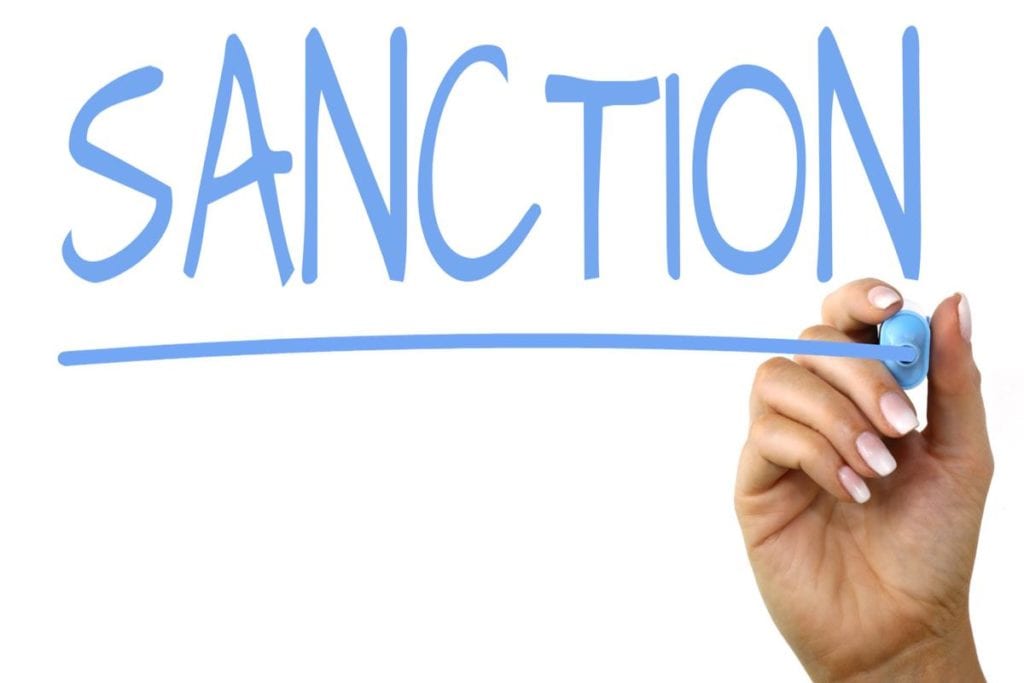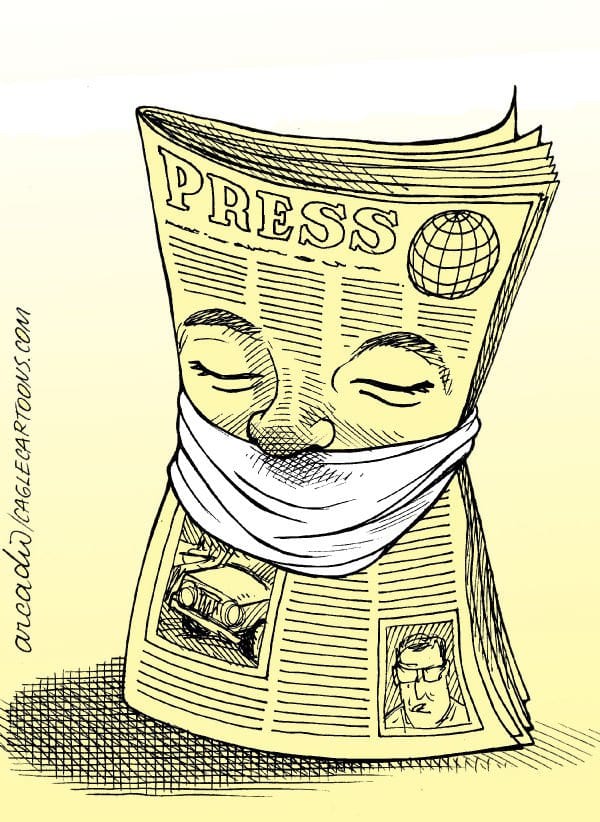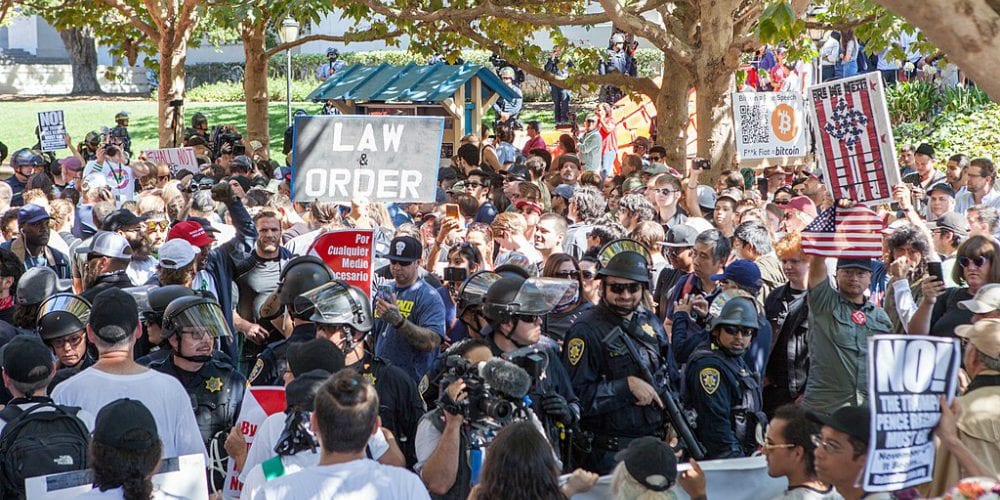“If you believe in freedom of speech, you believe in freedom of speech you don’t like. Goebbels was in favor of freedom of speech for those he liked. So was Stalin. If you’re in favor of freedom of speech, that means you’re in favor of freedom of speech precisely for views you despise.” – Noam Chomsky
Public universities and colleges are bound by the First Amendment. Private universities promise to uphold it. Yet students at colleges across the country frequently feel uneasy saying what they think or believe. In a recent survey, 54 percent of students report that they have self-censored in the classroom at some point in college. However, 78% of students say that colleges should expose students to all types of speech, showing that students are ready and willing to hear and engage new ideas –if their schools will let them. Each year, FIRE (The Foundation for Individual Rights in Education) publishes a list of the ten worst colleges for free speech. Using examples from free speech violations these schools committed, this article will identify signs of an anti-free speech college or university to look out for in any school.
QUICK LINKS
- Censoring Anything Controversial
- Not Following Policy
- Breaking Promises
- Free Speech Zones
- Leaving Students or Professors in Limbo
- Blacklisting Club Members
- Sanctioning Students for Peaceful Protest
- Title IX Abuse
- Censoring its Press
- Frequent Violence
Censoring Anything Controversial
“The ultimate measure of a man is not where he stands in moments of comfort and convenience, but where he stands at times of challenge and controversy.” – Martin Luther King Jr.
With a long history of censoring anything controversial, Rensselaer Polytechnic Institute in New York has censored “criticism of the Iraq War and critics of that criticism.” In 2017, RPI targeted students who believed that the administrators of the school were taking over the Rensselaer Union – an organization that has been operated by RPI students for over 100 years. Administrators denied permission to “Save the Union” peaceful demonstrations. RPI also tore down “Save the Union” signs. When students peacefully demonstrated anyway, school administration erected fences in order to keep student protesters away from would-be donors. They also brought charges against “leaders” of the demonstration.
Another example of the censoring of controversial subjects occurred at DePaul University. After refusing to pay for security for College Republican’s guest speakers in 2017, DePaul also required a socialist student organization to pay for its own security officers to monitor a discussion with the author of a book about Karl Marx since it was “potentially controversial.” According to FIRE, “DePaul’s requirement that students pay for security officers to monitor their discussions led us to ask whether DePaul was America’s worst school for free speech.”
Not Following Policy
Colleges that have developed clear policies and follow them tend to have the best environments for free speech. However, following policy in letter but not in spirit can also lead to the stifling of free speech on the part of college administrations.
Harvard, who has been on the FIRE “10 worst colleges” list four times, rescinded offers of admission from 10 students who had shared joke images in a private group chat on Facebook. According to Harvard policy, once the students had matriculated to Harvard, they could not be subjected to punishment. Since the students had only been admitted, Harvard used the technicality to regard them as unworthy of protection.
Rensselaer Polytechnic Institute, in the above example of censoring students over the potentially controversial subject matter, also set an egregious example of not following policy by refusing students’ peaceful demonstration on their campus. Although in a statement to FIRE, RPI “claimed student expression would not be punished ‘provided it is within the realm of civil discourse'” RPI has no written policy requiring “civil discourse.”
Many schools have been founded on principles of free speech and have policies that protect it. Schools that consistently violate their own policies will likely not create a free speech environment on their campuses.
Breaking Promises
“The promise given was a necessity of the past. The word broken is a necessity of the present.” – Niccolo Macchiavelli
Needless to say, it is a bad sign when the administration of a university breaks its word. Not only does Drexel University promise to protect professors’ speech rights, but they also promised professor Ciccariello-Maher that they would not press charges for a satirical tweet he posted concerning the “White Genocide.” Instead, they launched a private investigation. Drexel went on to bar Ciccariello-Maher from its campus because of threats from those outraged by his tweets. After one year, Ciccariello-Maher resigned from his position, commenting that, “We are all a single outrage campaign away from having no rights at all, as my case and many others make clear.”
According to FIRE, Ciccariello-Maher was right. Just in 2017, faculty at schools including the University of Tampa, Essex County College, Montclair State University, California State University, Fresno, and Trinity College faced suspensions, investigations, and firings because of outrage campaigns.
Free Speech Zones
Free Speech Zones on college campuses are designated areas where students may distribute certain materials or express their views. These zones are increasingly embroiled in controversy as students feel that free speech zones actually limit free speech. The law agrees with them. According to Inside Higher Ed, “lawmakers are generally quick to banish them from campuses…they hold up poorly to court challenges.” The article goes on to say that in the last year, the state legislatures in Colorado, Tennessee, and Utah have banned free-speech areas. Virginia, Missouri, and Arizona also previously outlawed the zones and Florida is looking to follow suit. FIRE has identified about 11 percent of colleges and universities that still maintain a free speech zone.
Not surprisingly, on FIRE’s worst college list, at least one of the schools was involved in a court case concerning a free speech zone. Last year, administrators at Los Angeles Pierce College prevented Kevin Shaw from handing out Spanish-language copies of the U.S. Constitution on behalf of Young Americans for Liberty. Administrators told Shaw that this activity could only be carried out in the tiny free speech zone which makes up .003 percent of the campus and is roughly the size of three parking spaces. After Shaw filed a lawsuit, the court rejected the school’s attempt to dismiss the lawsuit. Also according to FIRE, “In an opinion from the United States District Court for the Central District of California, the court ruled that open, outdoor areas of Pierce’s campus are public forums for student speech, whether or not school policy attempts to label them otherwise.”
Leaving Students or Professors in Limbo
Another sign of an institution that doesn’t respect its students or their right to free speech is not expediting the due process. Albion College gives us a flagrant example.
In September 2017, Albion College began an investigation into an email that student Alex Tokie sent to his College Republican peers. The investigation began when administrators notified Tokie in November that he was charged with violating Albion’s policies. When FIRE sent a letter to Albion reminding them of their free speech commitments, the school postponed Tokie’s Nov. 17 hearing. But instead of updating him, Albion left Tokie hanging. Weeks went by before Tokie heard from the school and finally, in December, the school contacted him. The administrators unreasonably insisted that he return to campus during winter break or the hearing would be held without him.
Tokie was able to reschedule his hearing for January 26th, 2018. However, administrators put Tokie through a four-hour hearing and then informed him that it could be weeks before they determined his fate. As of February 12th when the FIRE article was published that put Albion on the worst colleges for free speech list, Tokie was still awaiting the results of his hearing. According to FIRE, “No college promising free expression should put students through months-long investigations for jokes. Those that do can expect to find themselves on this list.”
Blacklisting Club Members
Harvard University is a four-time member of the “10 worst colleges” for free speech published by FIRE. In 2016, Harvard implemented a policy blacklisting the members of clubs that don’t promote Harvard’s vision. The decision includes members of independent, single-sex, off-campus organizations. It bans these members from the leadership of on-campus organizations or athletic teams.
“Harvard’s decision simply demonstrates that it is willing to sacrifice students’ basic freedom of association to the whims of whoever occupies the administrative suites today,” said FIRE co-founder, civil liberties attorney, and Harvard Law alumnus Harvey Silverglate. “Who’s to say that Harvard’s leaders five years from now won’t decide that Catholics or Republicans should be blacklisted because they might not line up with Harvard’s preferred values?”
Sanctioning Students for Peaceful Protest
Two schools from FIRE’s list of the worst colleges for Free Speech have sanctioned or brought charges against peacefully demonstrating students:
Already mentioned in this article, Rensselaer Polytechnic Institute in New York refused to allow peaceful protest from students who were critical of the administrators commandeering the Rensselaer Union. The union has been operated by the students of the school for over a century. When students demonstrated peacefully, school administration brought charges against the “leaders” of the demonstration. Leaders were identified on the basis that they were interviewed by local television stations. RPI even accused one of the students of operating a business because he handed out a flyer.
Fordham University’s Dean of Students overruled the United Student Government Senate and Executive Board to grant approval to a prospective chapter of Students for Justice in Palestine. Eldredge stated that he “cannot support an organization whose sole purpose is advocating the political goals of a specific group, and against a specific country.” When confronted by FIRE and the National Coalition Against Censorship, Fordham responded with a sanction on students who protested the university’s decision. According to FIRE, “the university’s decision….cemented its place on last year’s “10 Worst” list.
Title IX Abuse
Although the upholding of Title IX along with the MeToo movement, has emboldened victims of abuse, enabling thousands of innocent victims to speak out against their attackers, there has been a certain backlash against feminism and free speech.
Included on the “10 worst colleges for free speech” list by FIRE is Northwestern University. Northwestern is included on the list in large part because of the ongoing battle between Laura Kipnis, a feminist cultural critic, and Northwestern University, where she works as a professor. Northwestern University appeared on the list in 2016 partly because of what FIRE terms the “70-day ‘Title IX inquisition” of Professor Laura Kipnis for, ironically, writing an essay that was critical of Title IX abuses. Only through repeated efforts could Kipnis find out what the charges were. Kipnis described the way the university handled the hearing as a “kangaroo court.”
After finding, in 2016, that Kipnis was not responsible for violating any Northwestern policies, Kipnis was the subject of another Title IX investigation for writing a book saying that there are too many Title IX investigations. Kipnis was found, again, not responsible for violating any Northwestern policies.
Concerning the process, Laura Kipnis says, “I learned that professors around the country now routinely avoid discussing subjects in classes that might raise hackles.” After giving many examples including one of a tenured professor who would lie awake at night worrying about remarks she had made which might lead to student complaints, social-media campaigns, eventual job loss and being unable to support her child, Kipnis says, “I’d thought she was exaggerating, but that was before I learned about the Title IX complaints against me.”
Censoring its Press
“Want to write a provocative newspaper article to spark discussion about a contemporary social or political issue?” Better think twice before you attend Texas State University.
The independent Texas State newspaper The University Star published an editorial by Rudy Martinez. The editorial, titled “Your DNA is an abomination,” argued that “race is a social construct used to oppress minorities, and that “whiteness” should be destroyed, stating about those who he believes choose to identify as white: “I hate you because shouldn’t exist.”
Following the publication of this article Texas State’s Student Government president threatened to attack the paper’s funding unless the editor-in-chief, the opinions editor, and Rudy Martinez all resigned. Other students from Texas State began a petition to remove all funding from the newspaper. The director of TXST’s School of Journalism announced that she was forming a committee to review the newspaper’s editorial process.
FIRE sent a letter to Texas State informing them that an attack on the newspaper’s funding based on its content would be a violation of the First Amendment. They also reminded them that “interference with the editorial process by a review committee would constitute an infringement on press freedoms. Texas State responded with a letter stating that the idea of a review committee would be dropped for unstated reasons but gave no stated commitment to defending students’ right to free speech.
Frequent Violence
Although free speech is protected by the First Amendment, unlawful violence is not. In fact, even “true threats” or statements in which a speaker expresses a “serious” intent “to commit an act of unlawful violence” is not protected by the First Amendment. A sign of a college environment that does not promote or foster free speech is the frequent eruption of violence on campus.
In February of 2017, Berkeley University campus “erupted into violence.” “Former Breitbart editor Milo Yiannopoulos was set to speak and an estimated 1,500 people showed up…with the goal of shutting down the speech ‘by any means necessary.'” Protesters set fires, hurled Molotov cocktails, and allegedly assaulted other members of the crowd. The speech was canceled. There was also $100,000 worth of damage. Although not included in the article by FIRE, Berkeley was again in the news in August for violence on campus. This time when 100 anarchists and Antifa melded into a peaceful Sunday demonstration hurting at least 5 people.
Since the events of 2017, the Berkeley administration has intentionally attempted to reassert the right to free speech on campus. They hired a new chancellor who declared a “Free Speech Year” and provided the necessary security for campus speeches. It also unveiled a new policy to eliminate some of the hurdles to hosting an on-campus event. Because of these steps, FIRE gives Berkeley a yellow code speech rating. However, the frequent eruption of violence on campus may cause students to be apprehensive when giving their opinions….to say the least.
